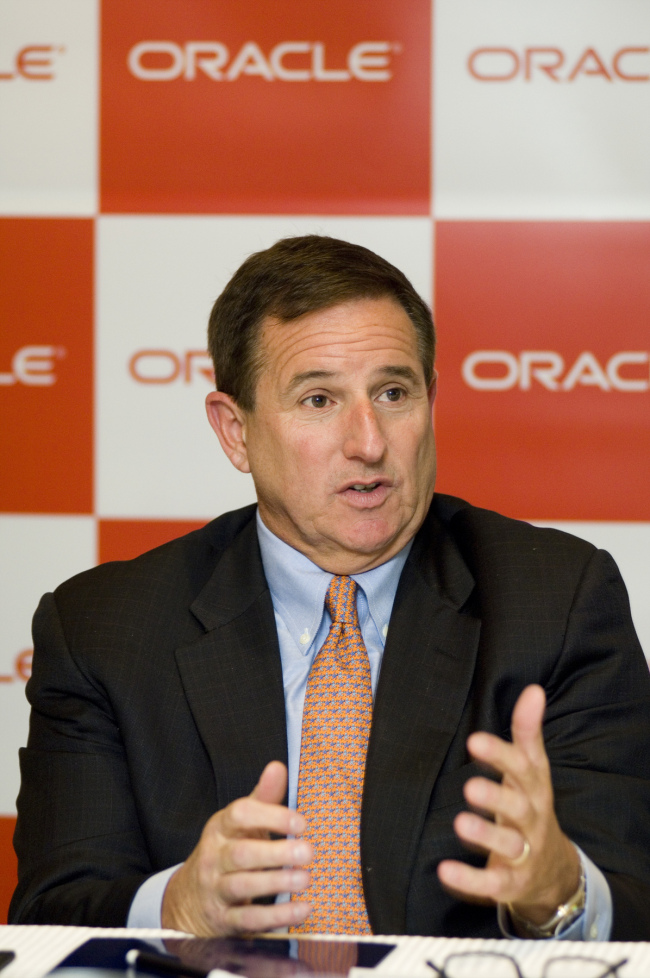‘Oracle set to lead cloud market’
Oracle CEO Mark Hurd emphasizes change in era of digital disruption
By Kim Young-wonPublished : Jan. 25, 2015 - 21:14
Software powerhouse Oracle has recently been turning to cloud computing businesses to meet the rising demand for services available over the Web.
Mark Hurd, Oracle’s cochief executive, expressed strong confidence in his company’s prospects in the cloud industry during a visit to South Korea last Thursday.
“We will sell more new cloud in the next year than any other company in the world,” said Mark Hurd at a joint interview with Korean news outlets on late Thursday afternoon.
Mark has been sharing the top job at the software behemoth with co-CEO Safra Catz since longtime CEO Larry Ellison stepped down last September.
He said that Oracle had a strong competitive edge as it was the only software developer with a complete suite of cloud-based applications ― Software as a Service, Platform as a Service and Infrastructure as a Service.
“Our strategy is to be the best of breed in each application," Hurd said.
Mark Hurd, Oracle’s cochief executive, expressed strong confidence in his company’s prospects in the cloud industry during a visit to South Korea last Thursday.
“We will sell more new cloud in the next year than any other company in the world,” said Mark Hurd at a joint interview with Korean news outlets on late Thursday afternoon.
Mark has been sharing the top job at the software behemoth with co-CEO Safra Catz since longtime CEO Larry Ellison stepped down last September.
He said that Oracle had a strong competitive edge as it was the only software developer with a complete suite of cloud-based applications ― Software as a Service, Platform as a Service and Infrastructure as a Service.
“Our strategy is to be the best of breed in each application," Hurd said.

Oracle, a leader in the market for on-premises software, has already proved its prowess in the cloud computing market with its revenue from the three cloud applications up 45 percent on-year during the second quarter of the 2014-2015 fiscal year, ending last November.
The company also saw bookings for the cloud services grow more than 140 percent on-year during the cited period.
Oracles’ archrivals SAP and IBM, on the other hand, are lagging behind in the transition to the cloud.
Mark was quick to dismiss the competitors, saying that IBM and SAP “both are declining.”
“SAP has not rewritten their applications for the cloud. They are merely taking their existing applications, putting a computer in a building and then shipping it to you as maintenance service and saying that is cloud,” said the co-CEO. “It is like taking an old car, and saying you can rent the old car.”
Digital disruption
He also stressed that digital disruption could be a huge threat to most conventional IT businesses and those in other industry sectors as well, including telecommunications and finance.
As demographics change with baby boomers retiring and new tech-savvy generations entering the workforce, corporate CEOs should find ways to adapt to the fast-changing business environment, he said.
“The world is going to move toward the world of transparency, and we have all got the same playing field. But the company that embraces it can get ahead and is going to win,” the CEO said, mentioning the power shift taking place across a wide range of industries due largely to the Internet and SNS, where almost all the information of firms is being shared by customers and employees.
The key to being successful in the era of digital disruption, he said, was “to have the right data in the right place at the right time with the right people who can make a difference in customer interactions.”
He said Oracle’s cloud applications could boost companies’ capability to harness data from all sorts of technologies including Internet of Things devices, and big data, to make real-time decisions, and to deal with digital disruption and next-generation applications.
Integrating software and hardware
When asked to give some advice to Korean hardware giants, including Samsung Electronics and LG Electronics, who are eager to get into the top echelon of the global software industry, he emphasized the importance of long-term efforts and investment.
“Software is hard, it took us six or seven years to get our (cloud-based) solutions driving,” the co-CEO said.
He also said that Oracle’s acquisition of Sun in 2010 was an excellent choice as the combination of hardware and software has helped the firm to build wholly integrated systems.
“We brought with it a lot of competence in chip design, packaging and productization of solutions, which we otherwise would not have had,” Mark said.
“When you can join the hardware competencies and software competencies, magic happens.”
Regarding possible investment plans in Korea, he said the future investment of Oracle in the nation would come in various forms including investing in human capital and education and creating jobs, also hinting the firm would expand its partnerships with Korean companies in the telecommunications, financial and technology fields.
By Kim Young-won (wone0102@heraldcorp.com)


![[AtoZ into Korean mind] Humor in Korea: Navigating the line between what's funny and not](http://res.heraldm.com/phpwas/restmb_idxmake.php?idx=644&simg=/content/image/2024/04/22/20240422050642_0.jpg&u=)

![[Exclusive] Korean military set to ban iPhones over 'security' concerns](http://res.heraldm.com/phpwas/restmb_idxmake.php?idx=644&simg=/content/image/2024/04/23/20240423050599_0.jpg&u=20240423183955)

![[Herald Interview] Why Toss invited hackers to penetrate its system](http://res.heraldm.com/phpwas/restmb_idxmake.php?idx=644&simg=/content/image/2024/04/22/20240422050569_0.jpg&u=20240422150649)
![[Graphic News] 77% of young Koreans still financially dependent](http://res.heraldm.com/phpwas/restmb_idxmake.php?idx=644&simg=/content/image/2024/04/22/20240422050762_0.gif&u=)






![[Exclusive] Korean military to ban iPhones over security issues](http://res.heraldm.com/phpwas/restmb_idxmake.php?idx=652&simg=/content/image/2024/04/23/20240423050599_0.jpg&u=20240423183955)



![[Today’s K-pop] Ateez confirms US tour details](http://res.heraldm.com/phpwas/restmb_idxmake.php?idx=642&simg=/content/image/2024/04/23/20240423050700_0.jpg&u=)